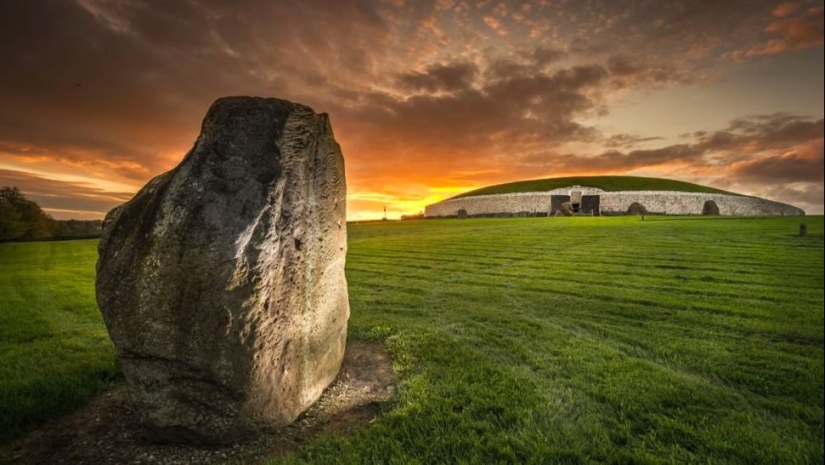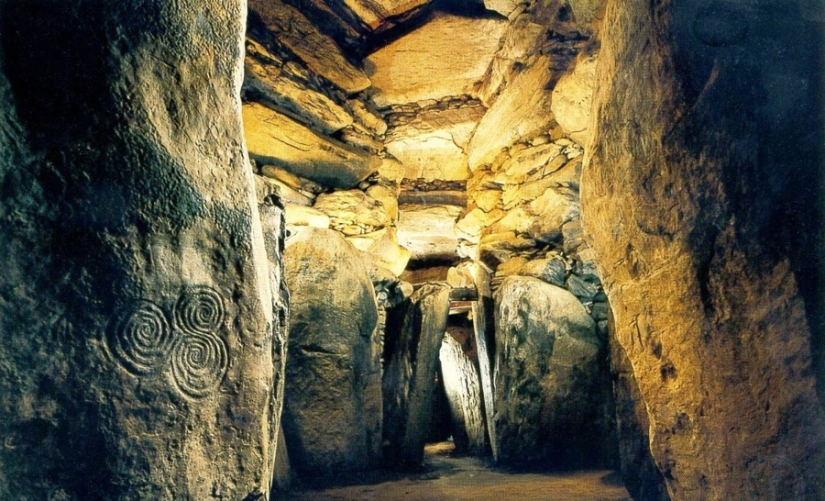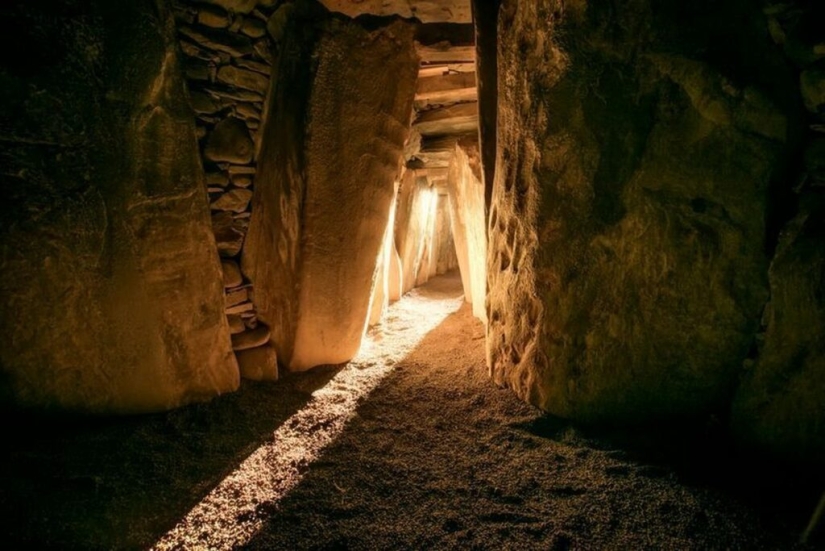Newgrange is a megalithic complex, more impressive than Stonehenge
Categories: Culture | Design and Architecture | History
By Pictolic https://pictolic.com/article/newgrange-is-a-megalithic-complex-more-impressive-than-stonehenge.htmlThe whole world knows the British Stonehenge and never tires of admiring this incredible structure. But even if we ignore the dubious origin of this complex, there are places that deserve more attention. One of them is the tomb of Newgrange, located near the capital of Ireland, Dublin. It is at least 1,000 years older than Stonehenge and 600 years older than the Great Pyramids at Giza.

At first glance, Newgrange is not too impressive. The complex looks like a flat hill, part of which is surrounded by a stone wall. The length of the embankment is 80 meters, and the height is 13 meters. But under an unsightly hillock hides an amazing tomb that has no analogues not only in Ireland, but also in the world.

The structure appeared around 3200 BC. Why the Newgrange was built, scientists are still arguing. Most are inclined to believe that this is the tomb of the Irish leaders. There is also an opinion that this is an underground temple complex dedicated to gods whose names have long been lost.

The boldest hypothesis says that the complex was an ancient observatory. In support of this version, some elements of the structure are strictly oriented to the cardinal directions. Perhaps Newgrange was used as a solar or lunar calendar.

The very name "Newgrange" translates as "new grain storage" (new granary). It appeared for a reason. One of the many rooms under the hill was indeed once filled with grain. But the Irish have their own explanation — they believe that the tomb is nothing but a Cave Grainne (Graney).

In Celtic mythology, Graney was the wife of Chief Fina McCool. She fell passionately in love with one of the military leaders of her husband Diarmaid, and the feelings were mutual. But a woman's lover dies, according to various versions, at the hands of a jealous husband or in battle with enemies. His body was carried to the tomb under the hill, and Graney followed him. She was near the body for a long time, mourning the loss. In honor of this unhappy romance, the tomb was named Newgrange.

Today the structure looks great, but it wasn't always like that. It has been decaying and collapsing for many centuries, until scientists and restorers took up it in the 20th century. The complex was restored in 1962 and 1975, not allowing it to completely collapse. During the reconstruction, some changes were made to the architecture of Newgrange. The masonry walls were altered in such a way that desperate tourists could not climb up it.

Research has shown that the tomb was only part of a huge complex. Once there were large blocks of stone around the hill, similar to the megaliths of Stonehenge. The "big circle" had a diameter of about 100 meters. Now only 12 blocks have been preserved. The skeleton of the tomb is based on 97 large boulders. Ancient engineers calculated the design in such a way that even strong earthquakes are not afraid of it.

The main building material was white quartz. There are no deposits of such a stone nearby: it was apparently delivered 70 km from the Wicklow area. In those days, people had not yet used horses and had not invented the wheel. Therefore, the materials were brought first by sea, and then by river on large boats or rafts. In total, approximately 200 thousand tons of stone and soil were used during construction.

A narrow corridor, 19 meters long, leads to the tomb. Some of the stones of its walls are covered with intricate carvings. The passage ends in the main hall. In this room there are three stone baths in which the cremated remains of bodies were once stored. Apparently, there were many more such baths, but they were stolen even before archaeologists became interested in Newgrange.

The vault of the hall is stepped, 6 meters high. We must pay tribute to the creators of the drainage system of the complex. For 40 centuries, water has not been able to find its way to the tomb. There are some other amazing moments. At 08.20 am on the days of the winter solstice (December 19-23), in the morning, a sunbeam penetrates through the light window above the entrance. He gradually moves along the main corridor, and at the end of the way briefly illuminates the main hall.

On normal days, Newgrange is not very popular among tourists. But on the day of the winter solstice, it is incredibly difficult to get into the complex. Thousands of guests want to see the beam illuminating the ancient crypt. Of course, Newgrange does not accommodate so many spectacle lovers, and tickets for the "show" are raffled off in a special lottery on October 1 every year. For those who are unlucky, with the help of a searchlight, an imitation of the solstice is arranged according to the schedule. Although this is not the same sight at all.
Recent articles

It's high time to admit that this whole hipster idea has gone too far. The concept has become so popular that even restaurants have ...

There is a perception that people only use 10% of their brain potential. But the heroes of our review, apparently, found a way to ...

New Year's is a time to surprise and delight loved ones not only with gifts but also with a unique presentation of the holiday ...